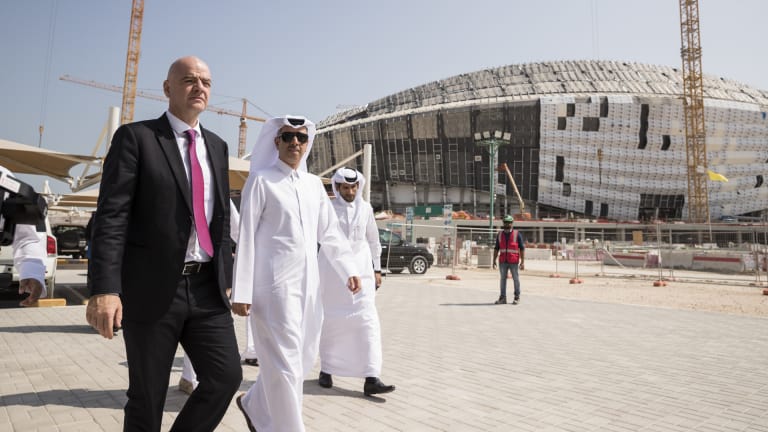FIFA’s top official has attempted to brush off questions related to human rights abuses taking place in preparation for the 2022 World Cup, which is set to be held in Qatar.
“[…] Pitches and stadiums will be spectacular and we will discover a part of the world that we do not all know. There was also distrust of Russia in 2018, then it was an exceptional World Cup.”
These are the words of FIFA President Gianni Infantino, seeking to address concerns about the upcoming World Cup.
Though the world was enchanted by Mbappé’s France and the exceptional matches played in Russia, the 2018 tournament was anything but exceptional for human rights. Rather than upholding its own human rights policies, FIFA opened the door for abuses that took place before and during the World Cup. It also allowed Russia to use the Cup to whitewash its international image.
During the construction of the stadiums and sites of the World Cup, forced labourers from North Korea were hired and 21 workers died. Harassment of human rights defenders and LGBT activists and community members from the government is an ongoing phenomenon. Despite these lamentable practices, hosting the World Cup has given prestige and legitimation to the practices of the Russian government, President Vladimir Putin, and Chechen leader Ramzan Kadyrov.
To our grave concern, a similar pattern of humans rights violations is repeating itself in Qatar. Since the beginning of stadium construction, hundreds of migrant workers have died on duty due to extreme and unsafe working conditions. International media and NGOs have reported the exploitation of these workers, who are forced to work up to 10 hours per day, even with the extremely high summer temperatures which regularly reach 45 degrees Celsius. Moreover, the work-to-rest-ratio that the workers are afforded does not take into account a number of significant factors that contribute to exhaustion, including the direct effect of sunlight. This translates to massive physical exertion, which leads to a rapid deterioration in workers’ health.
Rupchandra Rumba, a Nepali worker, was just 24 when he passed away. As an official cause of death, the quasi-governmental Supreme Committee for Delivery and Legacy cited “acute cardiorespiratory failure due to natural cause[s]” [emphasis added]. His case is not isolated, but the Qatari government has failed to investigate the deaths of hundreds of migrant workers, the majority of which have been filed as “natural causes.”
A lack of adequate rest time and heavy manual labour are not the only causes of death among migrant workers. Zac Cox was a British citizen who was working in a stadium in Doha when he fell from a height of approximately 40 meters, due to inadequate safety equipment and chaotic working conditions.
The exploitation of migrant workers is made possible due to the kafala system. Though Qatar has attempted to reform some aspects of the kafala system related to labourers’ rights and safety, implementation of these reforms is severely lacking in practice. As the cases above demonstrate, migrant labourers, in particular, continue to face agonizing and life-threatening work conditions.
The European Centre for Democracy and Human Rights (ECDHR) expresses its profound concern on the human rights situation surrounding the 2022 World Cup in Qatar. Unless higher standards are enforced, we fear that many more labourers will lose their lives. ECDHR calls on FIFA to end the exploitation of migrant workers used in the construction of stadiums for their flagship event and to denounce clear human rights’ violations. Furthermore, we call on Qatar to abolish the kafala system, to prosecute human traffickers, and to protect migrant workers’ rights.
At its best, the World Cup is an event that can bring the people of the world together. It can delight, captivate, and inspire us all. The agony and deaths of migrant labourers represents the World Cup at its worst. FIFA must not allow these violations of fundamental rights to ruin the wonderful occasion for global unity that it has created.

